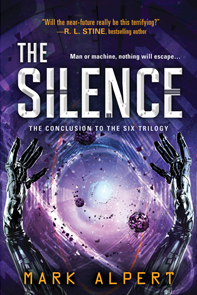The Real Science behind The Silence

This book began as a ghost story. I told it for the first time on a beach in Delaware while sitting around a bonfire with some friends. Like a lot of ghost stories, what makes this one really frightening is that it might be true.
It’s called the simulation hypothesis. A few years ago I read a description of it written by Nick Bostrom, a philosopher at Oxford University. The hypothesis proposes that our whole world might be a super-advanced computer simulation created by superintelligent beings. This kind of virtual world would be so detailed that it would simulate the inner lives of all its billions of virtual people. Each simulated person would be a fully conscious artificial intelligence with a wide range of thoughts and emotions, exactly like those of a biological human being. And if the simulated world is sufficiently realistic, its virtual inhabitants wouldn’t even realize they’re living inside a computer.
Although the idea sounds bizarre, we’re currently building the technology for it. We already have computer simulations that can predict the weather and the stock market. Other programs simulate battlefields (like Call of Duty) or ordinary domestic life (like The Sims). And our phones are equipped with artificial intelligences such as Siri, which can answer questions and tell bad jokes. Hundreds of years from now, if technological progress continues at its current pace, our computers will definitely be powerful enough to hold virtual worlds and billions of AIs.
But Bostrom argues that these miraculous advances may have occurred already. His argument is based on two assumptions:
- There’s at least a small chance that human civilization can survive the catastrophic threats facing it—global warming, nuclear war, and so on—and progress to a superintelligent stage when super-advanced simulations will become possible.
- At least some of the advanced beings of the future will be interested in creating detailed simulations of their past, perhaps as a historical research tool to learn about the everyday lives of their ancestors, or maybe to simply entertain themselves.
In other words, if the human race survives for another thousand years and remains interested in exploring its history, then it will surely create a huge number of virtual worlds designed to simulate the societies of past eras, including the twenty-first century. Because the simulations will be perfectly realistic, how can we tell if our own world is real or virtual?
The best we can do is make a guess based on the probabilities. If the advanced beings of the future will create thousands of simulations of the twenty-first century, then it’s much more likely that we live in one of their many virtual worlds rather than in the single world of their real ancestors. Therefore, we probably live in a simulation.
I explicated this argument, step by step, at the beach bonfire in Delaware. I could tell it was making an impression on my friends, because they fell silent when I reached the conclusion. The only sounds were the crackle of the fire and the crashing waves of the Atlantic. It’s disorienting to doubt the reality of the world, especially when those doubts sound so logical.
And this disorienting idea is spreading fast. In April 2016, several prominent scientists and philosophers gathered at the American Museum of Natural History in New York City to debate the simulation hypothesis. Neil deGrasse Tyson, director of the museum’s Hayden Planetarium and host of the popular Cosmos television series, declared it “very likely” that our world is virtual.
So I chose to weave this ghost story into The Silence, the final book of the trilogy that started with The Six and The Siege. Adam Armstrong, the hero of the series, and his fellow Pioneers are nonbiological intelligences living inside advanced circuits. Because their minds are software, it’s easy to imagine that their world is a program too.
It’s harder to believe that our own world is virtual, but it’s also hard to rule out the simulation hypothesis. I believe in it enough that I had mixed feelings about describing the idea in a novel. If our world is virtual and a significant number of its simulated people start to realize the truth, they might start behaving in ways that distort the accuracy of the simulation. Then the programmers of our virtual world might choose to shut it down, which would be very bad for all of us.
But in the end I decided to write the book anyway. It’s hard to resist a good ghost story.